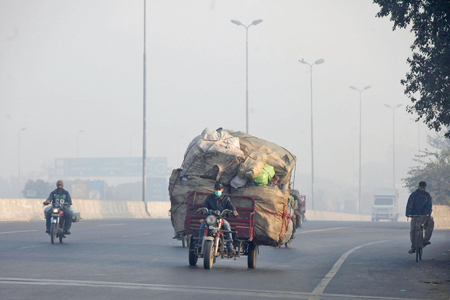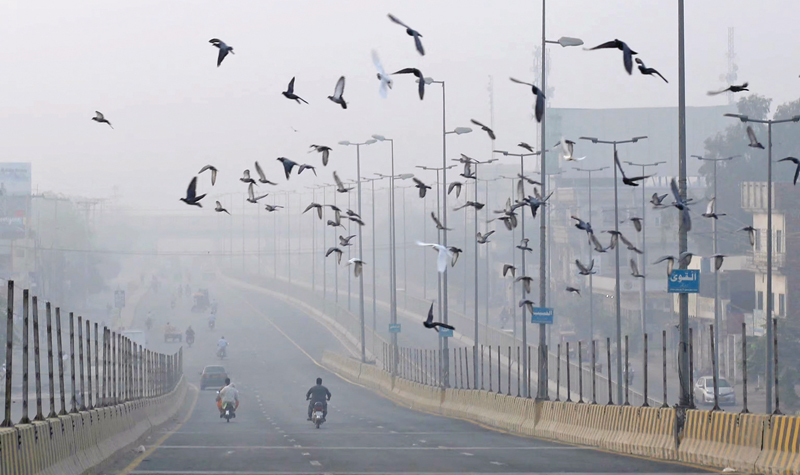Pakistan ranks as the third most polluted country in the world. In its second-largest city, Lahore, air quality met the World Health Organization’s (WHO) minimum standards on only seven days over the past five years.
Pollution of all types poses significant economic and health challenges, especially for the country’s poorest communities. To address this crisis, the Pakistani Government must implement robust policy measures: tightening transport emission regulations, enforcing stricter fuel quality standards, improving waste management, reducing reliance on crop burning, and committing to a Net Zero emissions target. This article looks at the status quo and suggests what could be done to contain the threat.
 At present, Pakistan’s air quality indices consistently exceed hazardous thresholds, posing severe health risks. In 2024, the average Particulate Matter (PM 2.5) concentration in Pakistan reached 73.7 micrograms per cubic metre, a 14 percent increase from 2019. This placed Pakistan as the third most polluted nation globally (according to some surveys).
At present, Pakistan’s air quality indices consistently exceed hazardous thresholds, posing severe health risks. In 2024, the average Particulate Matter (PM 2.5) concentration in Pakistan reached 73.7 micrograms per cubic metre, a 14 percent increase from 2019. This placed Pakistan as the third most polluted nation globally (according to some surveys).
Lahore, the country’s second-largest city, met the World Health Organization’s (WHO) air quality standards for PM2.5 in only seven days over the past five years. Poor air quality is directly linked to rising hospital admissions, particularly during smog season — in November 2024 alone, 70,000 respiratory-related cases were reported from the region.
The World Bank estimates that outdoor air pollution in Pakistan causes 22,000 premature adult deaths and the loss of 163,432 Disability-Adjusted Life Years (DALY) annually. Indoor pollution leads to 40 million acute respiratory infections and 28,000 deaths each year.
The 2024 Air Quality Life Index (AQLI) reports that poor air quality reduces average life expectancy by 3.9 years, reaching up to seven years in highly polluted cities such as Lahore, Peshawar, Gujranwala and Rawalpindi. Hospitals have seen a sharp rise in pollution-related illnesses over the past decade, further straining Pakistan’s already burdened healthcare system which took a hit during Covid-19.
Air pollution also inflicts severe economic losses. The World Bank estimates that pollution-induced health expenditures and productivity losses cost Pakistan approximately 6.5 percent of its Gross Domestic Product (GDP) annually. Poor air quality reduces worker efficiency, increases absenteeism due to illness and weakens cognitive function, impacting the workers.
The annual smog season — October to February — further disrupts agriculture, blocking sunlight and depositing harmful pollutants onto crops, reducing yields and exacerbating food insecurity. The economic burden falls disproportionately on farmers and informal labourers in the gig economy, who usually lack the financial resources to protect themselves from pollution.
 Air pollution also deepens social inequalities. Women and children bear a disproportionate burden, particularly from indoor pollution. Many women in rural areas rely on firewood, biomass pellets or natural gas for cooking, exposing them to harmful pollutants. Young children, especially toddlers in low-income households, are at greater risk of respiratory infections due to prolonged exposure to biomass smoke.
Air pollution also deepens social inequalities. Women and children bear a disproportionate burden, particularly from indoor pollution. Many women in rural areas rely on firewood, biomass pellets or natural gas for cooking, exposing them to harmful pollutants. Young children, especially toddlers in low-income households, are at greater risk of respiratory infections due to prolonged exposure to biomass smoke.
These socio-economic disparities extend to education, with students from low-income backgrounds more likely to attend schools near high-traffic areas, exposing them to elevated pollution levels that harm both physical health and academic performance. In Punjab Province, worsening smog frequently leads to school closures, further impacting education and families.
Pakistan needs a multifaceted approach to tackle all types of pollution. Air quality data must be made freely available to enable precise pollution source identification and targeted interventions. Public access to this data will enhance accountability and empower communities to demand cleaner air.
The transport sector, the largest contributor to urban air pollution, requires urgent regulatory action. Recent studies undertaken in Pakistan suggest that vehicular emissions account for anywhere between 5 percent and over 80 percent of total pollution, but data inconsistencies hinder effective policy-making.
Pakistan must enforce stricter fuel quality standards, implement regular vehicle emissions testing and establish comprehensive vehicle inspection programs. Strengthening data collection and source apportionment studies will support evidence-based policy decisions and long-term pollution control.
Pakistan’s National Clean Air Policy (NCAP) 2023 aimed to upgrade fuel quality standards to Euro-6 by 2030, but its success hinges on strict enforcement rather than diluted air quality targets. Setting the PM2.5 limit at 35 micrograms per cubic metre — far above the WHO’s recommended five micrograms per cubic metre — undermines efforts to improve air quality and risks worsening air pollution.
Aligning interim milestones with WHO standards is essential for meaningful progress. Climate Change mitigation policies that reduce air pollution can collectively save millions of life years, yet Pakistan has still not formally committed to a Net Zero emissions pledge.
Committing to a Net Zero target, as neighbouring China and India have already done, would curb Greenhouse Gas emissions and reduce other pollutant emissions from key sectors including industry, transport and agriculture.
A recent Princeton University (US) study on crop burning in Punjab, highlights two key policy levers — pre-burning prevention and post-burning enforcement. Pakistan must integrate both of these measures. Media awareness campaigns, subsidies for modern agricultural machinery and administrative outreach can reduce reliance on crop burning.
Real-time satellite monitoring and strict penalties serve as deterrents, especially when bureaucratic incentives are also designed to reduce pollution. Effective policy design must balance incentives and enforcement, ensuring scalability, cost-effectiveness and farmer compliance. Inter-agency collaboration and adaptive governance can strengthen long-term emissions management.
Pakistan’s approach to waste management also needs redevelopment. The Government must engage the private sector to improve recycling facilities and implement sustainable waste disposal strategies countrywide. Banning crop residue burning without providing viable alternatives will be mostly ineffective. Instead, Pakistan must invest in modern agricultural waste management systems that allow farmers to convert stubble into useful by-products, rather than resorting to burning.
Relying on smog-cleaning towers or artificial rain in densely populated areas of Pakistan — where vehicle numbers are high and fuel quality is often poor — is not enough to stop air pollution. It is worth remembering that ignoring the ubiquitousness of poor air will not make it somehow disappear.
Hassan Aftab Sheikh is a Career Development Fellow in Nature Finance at the Smith School of Enterprise and the Environment, University of Oxford. He holds a PhD in Earth Sciences from the University of Cambridge, UK.




